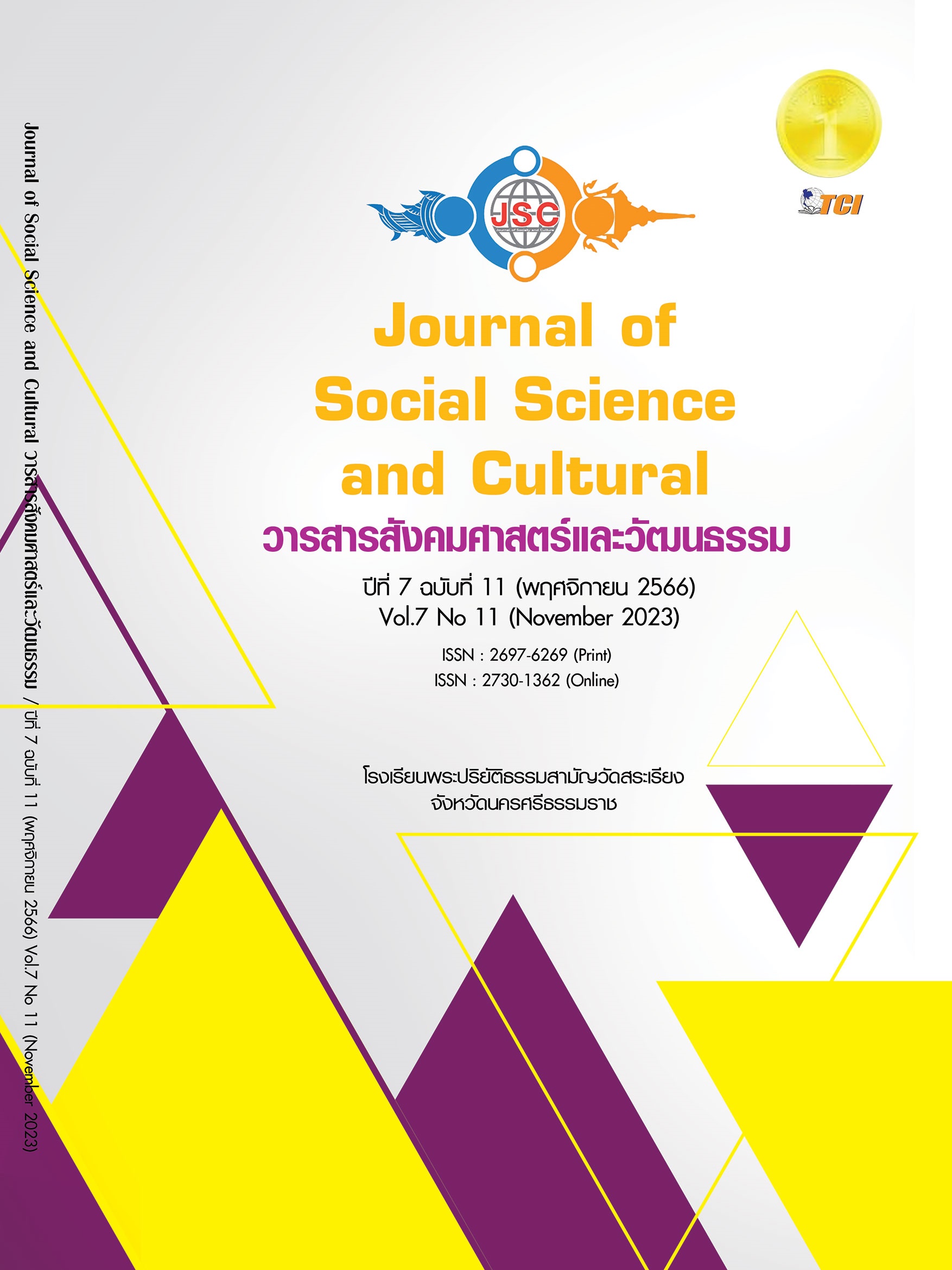THE ENHANCEMENT OF DIGITAL EMOTIONAL INTELLIGENCE OF GRADE 7 STUDENTS IN SCHOOL OF THE MINISTRY OF HIGHER EDUCATION, SCIENCE, RESEARCH AND INNOVATION THROUGH GUIDANCE ACTIVITIES BLENDED LEARNING
Main Article Content
Abstract
The purpose of this research were as follows: 1) to construct guidance activities blended learning to enhance digital emotional intelligence of students 2) To compare the digital emotional intelligence of grade 7 students in school of the Ministry of Higher Education, Science, Research and Innovation of experimental group before the experiment, after the experiment, and follow-up. The research is Research and Development. The population used in grade 7 students in Bangkok, the sample used is 80 students from the Office of the Ministry of Higher Education, Science, Research and Innovation, an experimental group 40 participants and a control group 40 participants. The primary research tools used is Digital Emotional Intelligence Assessment and Guidance Activities Blended learning. Statistics used in data analysis include percentage, mean, standard deviation, repeated measures analysis of variance (ANOVA), paired-sample t-test and post hoc testing. The research results were found as follows; 1) The guidance activities blended learning to enhance digital emotional intelligence of grade 7 students 12 times, had the application of psychological theories and techniques to enhance digital emotional intelligence that are consistent with the component has an activity format that exchanges feeling and enhancing digital emotional intelligence. 2) The experimental group had digital emotional intelligence before the experiment, after experiment and the follow-up were significantly at .05.
Article Details
References
กรุงเทพธุรกิจ. (2561). เด็กไทยยังเสี่ยงภัยไซเบอร์ พบตัวเลขสูงกว่าค่าเฉลี่ย. เรียกใช้เมื่อ 30 ตุลาคม 2565 จาก https://www.bangkokbiznews.com/news/detail/791601
กองทุนพัฒนาสื่อปลอดภัยและสร้างสรรค์. (2564). Digital Empathy เพราะโลกนี้ไม่ได้มีแค่พวกเรา. เรียกใช้เมื่อ 15 เมษายน 2565 จาก https://www.thaimediafund.or.th/wp-content/uploads/2021/08/%E0 %B8%A3%E0%B8%A7%E0%B8%A1%E0%B9%80%E0%B8%A5%E0%B9%88%E0%B8%A1%E0%B8%88%E0%B8%94%E0%B8%AB%E0%B8%A1%E0%B8%B2%E0%B8%A2%E0%B8%82%E0%B9%88%E0%B8%B2%E0%
B8%A7-07-web.pdf
พรทิพย์ เย็นจะบก และคณะ. (2563). โลกกลม ๆ ที่เรียกว่าดิจิทัล. (พิมพ์ครั้งที่ 1). กรุงเทพมหานคร: สำนักงานกองทุนพัฒนาสื่อ.
สกล วรเจริญศรี. (2558). การแนะแนวเพื่อพัฒนาคุณค่าแห่งตน. กรุงเทพมหานคร: ภาควิชาการแนะแนวและจิตวิทยาการศึกษา คณะศึกษาศาสตร์, มหาวิทยาลัยศรีนครินทรวิโรฒ.
สำนักงานพัฒนาธุรกรรมทางอิเล็กทรอนิกส์. (2562). วัยใส วัยเก๋า ฉลาดรู้เน็ต. (พิมพ์ครั้งที่ 2). กรุงเทพมหานคร: สำนักงานพัฒนาธุรกรรมทางอิเล็กทรอนิกส์.
Bonk, C. J. & Graham, C. R. (2006). Handbook of blended learning: Global perspectives, local designs. San Francisco, CA: Pfeiffer Publishing.
Chaimongkol, N. (2021). Digital Kids Asia Pacific (DKAP) in Thailand. STOU Education Journal, 14(1), 128-140.
DQ Institute. (2019). DQ global standards report 2019 common framework for digital literacy, skills and readiness. Retrieved June 10, 2021, from https://www.dqinstitute.org/wp-content/uploads/2019/03/DQGlobalStandardsReport2019.pdf.
Goleman, D. (1995). Emotional Intelligence: Why it can matter move than IQ. New York: Bantam Book.
Mayer, J. D. & Salovey, P. (1990). Emotional Intelligence. Imagination, Cognition and Personality, 9(3), 185-211.
Moore, G. M. (2013). Handbook of Distance Education. New York: Routledge.
Park, Y. (2016). 8 digital skills we must teach our children. Retrieved April 20, 2021, from https://www.weforum.org/agenda/2016/06/8-digital-skills-we-must-teach-our-children
UNESCO Digital Kids Asia-Pacific. (2019). Digital kids Asia-pacific insights from children’s digital citizenship. Retrieved April 15, 2021, from https://www.unescap.org/sites/default/files /ITU%20S2.6%20Insights%20from%20Children%27s%20Digital%20Citizenship%2C%20UNESCO.pdf


